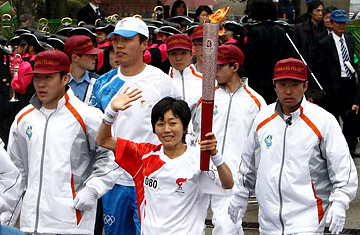
Mizuki Noguchi carries the Olympic Torch as 100 police officers guard near Nagano Sports park on April 26, 2008 in Nagano, Japan.
Cold rain in Nagano on Saturday failed to dampen the spirits of thousands of onlookers as they waited to catch a glimpse of the Olympic torch during the flame's 16th international stop before its arrival in Hong Kong on April 30.
Thousands of Japanese riot police were mobilized to safeguard the torch along its 18.7 km (11.6 mi) route in the city of Nagano — the host of the 1998 Winter Olympics. The show of force kept most protesters in line. Compared with those of some previous host cities, Nagano authorities managed to maintain relative calm, but the cacophony of slogans shouted by pro-China or pro-Tibet demonstrators, Japanese nationalists and human rights organizations flooded air already full of the colors of Chinese, Tibetan and Japanese flags. "Clearly, the mix of demonstrators shows that Japan is a peaceful nation after all," said Shinjyo Anzai, a monk of the Buddhist temple, Zenkoji, which refused to act as the starting point for the torch relay for security reasons and out of sympathy for Tibetan Buddhism. "Change won't come from the top — it comes from citizens with different opinions, and each needs to recognize the existence of the other."
The torch route was packed with mostly peaceful demonstrators. "They started the Olympics in order to bring different sides together," said a Chinese protester from Dalian, who has lived in Japan for two years as a Japanese company employee. "I like sports. I like Japan. Politics shouldn't be directed at the Games." But politics dogged the torch's journey through Europe and the U.S., sparking protest about China's human rights record and its treatment of Tibet. Japan knew the relay needed to be calm to maintain the recent easing of historical tensions between the Japanese and the Chinese. Chinese President Hu Jintao is scheduled to visit Japan May 6-10, the first visit by a Chinese head of state since Jiang Zemin came to Tokyo in 1998.
The torch relay in Nagano came off without serious incident because it had to. The public was not allowed at the car park where the relay began at 8:30 a.m., after the Zenkoji monks held a prayer ceremony for victims of the recent uprising in Tibet. Shortly afterwards, pro-Chinese demonstrators yelled "Zhongguo, jia you!" (which means "China, go for it!") at pro-Tibet demonstrators who yelled back "Free Tibet." That dialogue continued at high volume throughout most of the 5-hour relay.
More than 100 police officers ran with the torch as it was passed along by about 80 runners. Riot police lined the streets. Three helicopters flew overhead. But only two Chinese guards were allowed to accompany the flame, because of Japan's concern over their treatment of demonstrators during previous relays. A man with a Tibetan flag tried to stop the torch early on and was immediately dragged away by police. But aside from a few minor deterrences — including a few raw eggs tossed from the crowd — the torch bearers' passage was without incident. The flame arrived at its final destination, the outdoor stage of the Nagano cultural building, in the hands of Japan's gold-medalist marathoner Mizuki Noguchi. Japan emerged from its Olympic relay with its honor intact and its relations with China unscathed.
